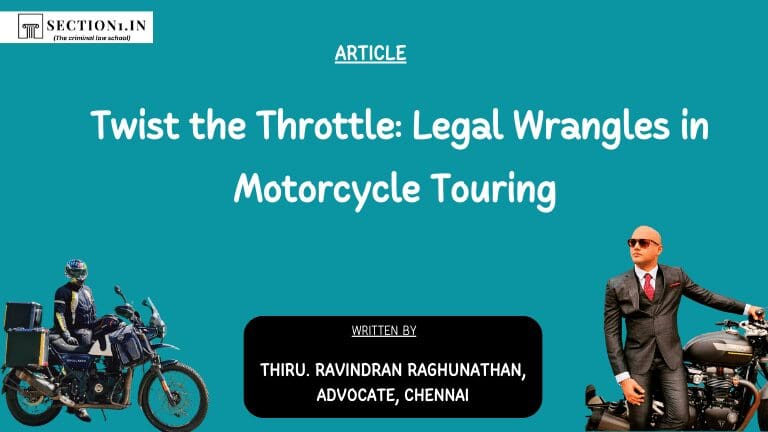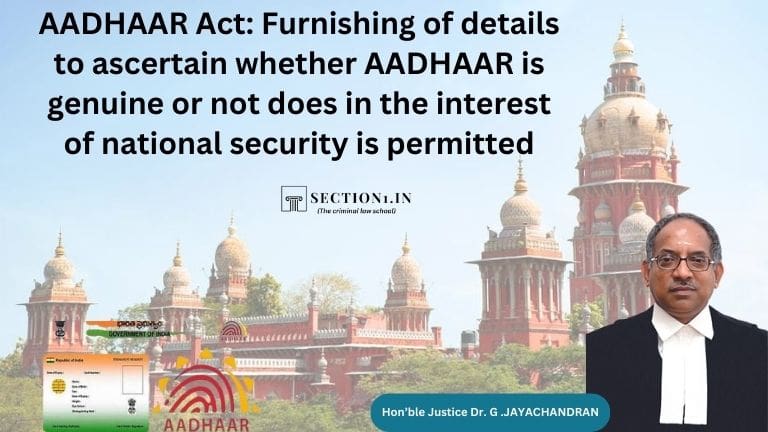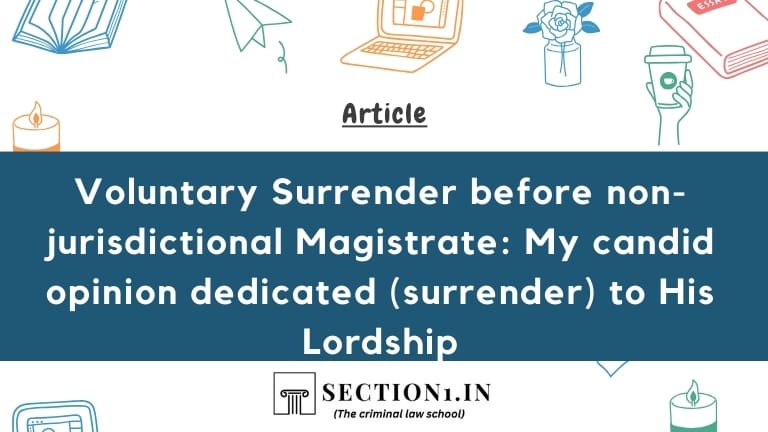I just read Babitha Surendran vs. State (2015 (2) MWN (Crl) 468) in which a learned single judge has handed over the power of getting specimen signatures from the accused to the Investigating Officer under section 311-A Cr.P.C what the legislature has omitted very carefully.
Section 311-A Cr.P.C had been very carefully drafted by the Legislature and begins with unequivocal terms that ‘If a Magistrate of the first class is satisfied’, and not ‘If a Magistrate or officer satisfied’ [one cannot accentuate arguing that the section does not starts with the words ‘only if a magistrate’ inasmuch as the same cannot add the word ‘only’ before wherever the word ‘magistrate’ appears in Cr.P.C]. There are many instances in the Code of Criminal Procedure, 1973 where powers are equally allocated between Magistrate and Police officer [sections 100 & 165 Cr.P.C, sections 161 & 164 Cr.P.C (also see, Jogendra Nahak & Others vs. State of Orissa & Others – AIR 1999 SC 2565), section 437 (4) e.t.c…]. But, after careful drafting, Parliament has apportioned the power of getting specimen signatures from the accused only to the Magistrate even during the investigation by the Investigating Officer.
In simple words section, 311-A Cr.P.C enunciates that the specimen signature shall not be obtained without the knowledge of Magistrate or behind the back of Magistrate even during the investigation. This may be the logical and rudimentary understanding of section 311-A Cr.P.C. If the Parliament considers getting specimen signatures will facilitate investigating officer during the investigation, then there is no embargo for the draftsmen to engraft such power under the chapter XII of the Cr.P.C.
I am not ignorant of the judgment of the Madras Division Bench [Manickam vs. State – (2009)5 CTC 316] (which was not brought before the learned Single Judge in his judgment [Babitha Surendran vs. State – 2015 (2) MWN (Crl) 468]) in this subject which has held as follows:
“It is to be noted that those provisions do not put an embargo on the Investigating Officers from acting on their own for lifting the fingerprint, signature or handwriting of the accused during the course of investigation”.
I am quoting the above relevant paragraph from the judgment to show that even the Division Bench of this Hon’ble Court did not prioritise the very beginning words of section 311-A Cr.P.C. Equally the Madras high court division bench did not hand over the entire powers to the Investigation Officer cutting the right of being satisfied by the magistrate in getting specimen signatures.
To put it another way, the Legislature has carefully drafted and conceded the powers only to the Magistrate and not to the Investigating Officer which may be understood from the following guidelines of the Hon’ble Supreme Court [in Mohd. Aman and another v. State of Rajasthan, 1997 (10) SCC 44] which runs as follows:
“Apart from the above missing link and the suspicious circumstances surrounding the same, there is another circumstance which also casts a serious mistrust as to genuineness of the evidence. Even though the specimen fingerprints of Mohd. Aman had to be taken on a number of occasions at the behest of the Bureau, they were never taken before or under the order of a Magistrate in accordance with Section 5 of the Identification of Prisoners Act. It is true that under Section 4 thereof police is competent to take fingerprints of the accused but to dispel any suspicion as to its bona fides or to eliminate the possibility of fabrication of evidence it was eminently desirable that they were taken before or under the order of a Magistrate”.
Presumptions may vary if it pertains to the circumstances with regard to the facts; but, regarding the law, it remains same in every case. If the Legislature has handed over the power of getting specimen signatures from the accused to the Magistrate under section 311-A; then, getting specimen signatures becomes the official act of the Magistrate and not the Investigating Officer, indeed, the act of Investigating Officer getting specimen signature behind or without the knowledge of Magistrate will be an ‘unofficial act’. Therefore, section – 114(e) Evidence Act does not come to rescue to the Investigating Officer if he circumvents section 311-A Cr.P.C by obtaining specimen signatures mechanically or adamantly from the accused without the knowledge of Magistrate. If the Hon’ble Supreme Court has suspected the genuineness of getting fingerprints by the investigating officer (there is every chance of getting specimen signatures adamantly) than that is the presumption supposed to be adopted.
Let’s go with an example (before reading this example kindly read the example given in babitha surendran’s case): Suppose one ‘X’ came to the Police Station and informs SHO about one ‘Y’ as if ‘Y’ has sent a letter containing serious insinuations and also handing out death threat to ‘X’ in the letterhead of ‘Y’ (in this year of 2000’s where the development in communications through latest technology touches sky, let us assume that ‘Y’ may be the last person on this planet using his “own handwriting” in his “own letterhead” to send a letter contains death threatening words to ‘X’). The first and foremost duty of the SHO/Investigation Officer is to register FIR (cognizable offence), then he may or may not arrest ‘Y’ (remember that as per section311-A Cr.P.C arrest is mandatory), but, he ought to send an application under section 311-A Cr.P.C along with the FIR being sent to the jurisdictional Magistrate without delay. Further, it is the SHO/I.O’s duty to “satisfy” the Jurisdictional Magistrate as contemplated in section 311-A Cr.P.C as to why he requires the specimen signatures of one ‘Y’ [the question of absconding will not arise if the I.O has already chosen either to arrest or not to arrest ‘Y’. But, in my opinion the word ‘satisfies’ could have been engrafted by the legislators to satisfy the magistrate that he (I.O) would not obtain the Specimen Signature adamantly from the proposed accused]. This is the place where the interpretation of Courts shall come up as to whether notice to be given to proposed accused? or what are the legal requirements for the word ‘satisfy’ may all be needed, instead the court has directly granted the power to the SHO/I.O to acquire the specimen signatures of proposed accused.
The Hon’ble Full Bench of Delhi [Sapan Haldar & Anr. vs State on 25 May, 2012] regarding the above subject is very intense and the same is appreciable.
In my opinion, it is wise not to circumvent the powers of the Judicial Magistrate or not to obtain specimen signatures behind the knowledge of courts under section 311-A Cr.P.C.
Conclusion: Kindly note that when I wrote this article in the year 2015, I have distinguished my aforesaid view in the strength of Ritesh Sinha vs The State of Uttar Pradesh and another reported in (2012) 12 SCALE 10=(2013) 2 SCC 357=(2013) 2 SCC(Cri) 748 (referred to larger bench) which was not discussed in Babitha Surendran vs. State (2015 (2) MWN (Crl) 468.
Now (2019), the larger bench 3 Judge bench observation in Ritesh Sinha vs. The State of U.P (which was referred) reported in (2019) 10 SCALE 341=(2019) 8 SCC 1=(2019) 3 SCC(Cri) 252 finally has confirmed my above view taken in the year 2015 and has held as follows:
“24. Would a judicial order compelling a person to give a sample of his voice violate the fundamental right to privacy under Article 20(3) of the Constitution, is the next question. The issue is interesting and debatable but not having been argued before us it will suffice to note that in view of the opinion rendered by this Court in Modern Dental College and Research Centre and others vs. State of Madhya Pradesh and others, (2016) 7 SCC 353, Gobind vs. State of Madhya Pradesh and another, (1975) 2 SCC 148 and the Nine Judge’s Bench of this Court in K.S. Puttaswamy and another vs. Union of India and others, (2017) 10 SCC 1 the fundamental right to privacy cannot be construed as absolute and but must bow down to compelling public interest. We refrain from any further discussion and consider it appropriate not to record any further observation on an issue not specifically raised before us.
25. In the light of the above discussions, we unhesitatingly take the view that until explicit provisions are engrafted in the Code of Criminal Procedure by Parliament, a Judicial Magistrate must be conceded the power to order a person to give a sample of his voice for the purpose of investigation of a crime. Such power has to be conferred on a Magistrate by a process of judicial interpretation and in exercise of jurisdiction vested in this Court under Article 142 of the Constitution of India. We order accordingly and consequently dispose the appeals in terms of the above”.
Yours
Ramprakash Rajagopal
Advocate, .






